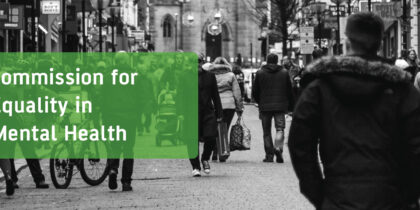This month, Alethea is joined by Andy Bell, deputy chief executive at Centre for Mental Health, to reflect on some of our recent work and the power of applying research to real life. The episode covers a lot of ground, from the changes he’s seen in policy and services over many years at the Centre, to our work on race equality and more widely in the campaign for equality in mental health.
Listen to the episode on Spotify or iTunes. The full transcript is available below.
Show notes:
- Our work on Covid-19
- Equally Well: resource on Covid-19 vaccination
- Our latest forecast estimating the impact of the pandemic on mental health
- Our work on race equality
- Our report Breaking the circles of fear
- The final report of the Commission for Equality, Mental health for all?
- Our response to the Sewell report
Music by scottholmesmusic.com
Transcript
Alethea Joshi (AJ): Hello, and welcome to Centre for Mental Health’s podcast. Here at the Centre, we are dedicated to eradicating mental health inequalities by changing policy and practice. So earlier this month, I caught up with Andy Bell, deputy chief executive at the Centre, to tell us a bit more about our recent work and the power of applying research to real life. We’ve covered a lot of ground on this one, from the changes he’s seen in mental health over the many years at the Centre, to our work on race equality, and more widely in campaigning for equality in mental health.
So I’m delighted to be here with Andy Bell, deputy chief executive at Centre for Mental Health. And thank you so much for joining us, Andy.
Andy Bell (AB): Thank you.
AJ: I knew that our listeners and people across the sector would be really keen to hear from you and to glean some of that Andy Bell wisdom that you are known for, that we are grateful to you for. So before you cringe too much, Andy, can you just tell us a little bit more about what you do at the Centre?
AB: Sure. So I work with the research that colleagues at the Centre produce to make sure that the work we do is heard in the places it needs to be heard, that we have influence as an organisation where we can, we’re able to share our knowledge as widely as possible. But also that the work we do is relevant and useful to the people we work with, whether that is people living with mental health difficulties, who want to make change locally, or whether it’s politicians at a national level, local government, people working in the NHS, people working in the voluntary sector; it’s all about making sure that we’re producing work that’s relevant to them. And that we’re able to hear what’s going on for people and to understand that and to provide support wherever possible that meets their needs.
AJ: So you’re really involved in taking that research and applying it, speaking to policymakers and decision makers about how they could essentially make better decisions for people with mental health problems. Is that right?
AB: Yeah, it’s putting research evidence into the real world, in plain English, in ways that people can use and understand. And a lot of research evidence is stuck in academic journals, it’s not necessarily heard about or known about. And a lot of the evidence we produce, of course, we put into reports. And we know that it takes a while for reports to get heard and listened to: simply writing some words on a page, sticking it on our website isn’t enough. We need to make sure that people are able to use our work and that it makes sense to people. And I think we’re very fortunate that the work we produce is done with very much that in mind, but of course, you then need to apply that in real life situations and working with government, or national bodies, or indeed local councils, it’s all about helping them to solve the problems they’re trying to solve in real time. And sometimes that’s going back to work that we might have published a while ago, or research that we’re aware of from other people, because Centre for Mental Health doesn’t have a monopoly on knowledge and wisdom in this sector.
AJ: I mean, it’s interesting, because you said there, about applying research to real life and in real time. I guess the question for some people might be, there’s a lot of people struggling here and now with their mental health, you know, why the focus on policy and research? It can it can feel a bit a bit dry, I guess. And you know, is it really going to make a difference?
AB: Yeah, I mean, and that’s right, because, when you’re dealing with things that are about changing policy, or practice, or the way people think, it can feel very divorced from people’s real life situations. I think one of the great joys of working at Centre for Mental Health with the partners we have is that we’re very often able very quickly to identify those issues people are experiencing, and put those directly to folk in positions of power and influence to get things changed. But we also know that policy changes do sometimes make changes in people’s real lives. And we’ve seen examples of things that have both gone well and badly in terms of policies around mental health, that have changed people’s lives, both for good and ill. So for example, when policies change, around, let’s say, support for women during pregnancy, around their mental health, we’ve seen some very significant policy changes in recent years, which either have already or will over time, make a significant difference to women’s experiences of the help available to them.
But we’ve also seen examples for example, in benefit policies, where changes made nationally have done enormous harm to people’s mental health. And again, it’s really important that we’re able to feed that back and share it because we know that every policy that gets made has an impact on people’s mental health and on the lives of people living with a mental illness. And our job in a way is to be able to identify those, where possible to preempt and try and get the policies right in the first place. But sometimes it’s about giving feedback on how things are going and where things aren’t as good as they should be, to try and bring about change. So yes, it can feel a mile away from real experience. But in a sense, our work is not about helping people directly so much as it is about making the bigger changes that will overall change lots and lots of people’s lives, many of whom, most of whom, we’ll have no contact with directly.
AJ: Thank you. That’s really helpful, Andy, and also, some really helpful examples there. And I was reflecting on the fact that you’ve been at the Centre a long time. And I mean, you know, I’ve really only been at Centre for five years, and I’ve seen a lot of change in the mental health landscape in that time. But I guess you mentioned a few examples there, but I wondered if there were other examples, kind of key areas where you’ve seen sort of big changes in mental health policy and in mental health services?
AB: Yeah. And there have been many, I mean, I think one example that comes to mind immediately is the current debate around the Mental Health Act. And the last time the Mental Health Act was being debated, it was around about 2006-7. In fact, it took a long time from about 1999, when the government at the time first said it wanted to change the Mental Health Act, through to 2007 when it actually did. The debate then was unfortunately very much about people with a mental illness as being a danger to others, it was a very paternalistic debate, it was very often full of prejudice, actually, it was a terrible debate. And a lot of us who were involved at the time had to work really hard to shift the terms of debate, away from a focus on dangerousness and people with a mental illness as a risk to others, to focusing on people’s rights and having a system which works better for those individuals.
Since that time, use of the Mental Health Act has gone up and up every year. And we’re really worried about that, and should be really worried about that. But at least the debate we’re having now about the Mental Health Act is one about how we have a better balance between wanting to keep people safe and wanting to respect people’s rights. We’re having a focus on race equality within the Mental Health Act, we’re having a focus on treating people with dignity. And many of the changes that government’s proposing around the Mental Health Act will hopefully make it something which is more respectful of people’s rights and abilities to go about their lives. So that’s a significant change. And it’s been brought about I think, by a change in the way policymakers perceive mental health as a topic, and people with mental illness as a group whose rights should be respected. And that is a significant change.
I think you can see other examples around work, for example, the way in which many years ago, work wasn’t seen as a possibility for people living with a mental illness, or we had a rather unhelpful lack of communication, I guess, between either seeing work as something that that people should be forced into, if you like, or something that people should be protected from, rather than understanding from the experiences and views of people living with mental illness, about what work means to them. Things are not perfect now, we still have a benefit system which treats people appallingly badly. But we are at least now investing in supported employment services within the NHS. And we’re at least now beginning to see that work can be good for your mental health where it’s good. There’s lots more to do around that; we need to really change some of the working conditions people are in that cause poor mental health, for far too many. But again, we’re on a road, we’re on a journey, we’re not finished, but things are beginning to change.
AJ: Thank you Andy, it’s so helpful to have that historical policy insight for people like me who are a bit newer in the field, it’s really helpful to just see that things are changing. I think also, it’s an encouragement for us who are working in the system, who could very easily feel frustrated at where sometimes we see a lack of progress, to see that things are changing.
AB: Yeah, the pace of change can feel absolutely glacial sometimes. And of course, there’s a huge gap sometimes between changing a policy and it actually having an effect. So when for the first time, government realised that we didn’t have waiting time targets for mental health services in the way we do for other parts of the NHS, it took a long, long time for that realisation and that commitment to treat mental health a bit more equally by having some waiting time targets for that actually to take effect and that actually to make a difference to people. And again, we’re not finished. We’re really only on the starting blocks with that, but we do see some examples of progress. Sometimes of course, things go backwards. And that’s deeply frustrating.
But nonetheless, you know, when change feels so very slow, particularly translating good ideas into real life, it can feel like nothing can ever change. And actually, the record over the last 15 to 20 years shows, it absolutely can. But progress is precious, you make it step by step, and sometimes you get pushed back and you have to kind of pick yourself up and keep moving forward. You can make attritional progress, you can get kicked back. But you know, we keep on pushing on.
AJ: Yeah, that’s a real encouragement to us. And I was sort of reflecting on the fact that you and I have not actually been in the same physical space for over a year now, which feels very bizarre. I’ve seen a lot of your head, which is no bad thing. And that’s obviously due to the pandemic that we’ve all been living through. And as many of our followers might have seen, we’ve obviously been pretty busy in that time, seeking to provide analysis and research and support on mental health during a pandemic. So I wondered if you might be able to talk us through the work a bit and what we set out to do in the pandemic?
AB: Yeah, so a year or so ago, when we were all confined to home and having to work separately to one another, and we certainly didn’t think we’d be doing that in a year’s time without any break, but here we are. And we had a decision to make as Centre for Mental Health. Do we kind of close up the hatches? Do we focus on what we would have been doing anyway and just, you know, take a very cautious approach? Or do we as an organisation think, actually, we have a part to play in supporting the national response, and indeed, international response, in fact, to the mental health implications of this thing we’re going through. And we took a collective decision, we wanted to do the latter, we wanted to make a contribution, we wanted to use the skills and knowledge of our full staff team to make that response. And so during the last year, we’ve produced a number of resources, we’ve been poring over data, we’ve been looking at what’s going on, we’ve been listening to people’s real life experiences, in order really to do two things: one of which is to identify what the mental health implications are, and thinking of that right the way through life from early childhood through to later life, and which groups of people have had their mental health particularly threatened by what we’ve been all going through. And not to do that just to kind of identify problems; to do that in order really to identify solutions. So we did that in order to help organisations and individuals working within the system, both statutory and voluntary sector, in the NHS, in national government, in local government, to use their resources as best as possible to respond to the needs that we’re seeing.
So for example, some of that has been very immediate. We identified early on that many people living with a mental illness were having trouble getting access to food and vital provisions. And they weren’t getting the support from government. So we were able to relay that fact, and get a fairly quick solution to that. We’ve also been heavily involved in the vaccination programme, not running it ourselves, but in ensuring that people living with a mental illness have fair access to vaccinations. And that’s been both for flu and for COVID itself, of course, more recently. So we’ve learned particularly that for people with personality disorder diagnoses, and people with eating disorders, there’s been a real problem in terms of access to vaccination for some, in some local areas there’s been a really positive response and they’ve been included alongside people with schizophrenia and bipolar disorder. In other areas, they’ve been told no. That’s been really frustrating for them, extremely frustrating for them, bearing in mind, this is a life-saving intervention potentially. And so we’ve had to keep a real close eye on that. And I think it’s reminded us, as if we need it, that there are still some groups of people living with mental health diagnoses that seem to be more about exclusion than inclusion, who don’t get the right support, who aren’t included, who aren’t given the kind of help that any of us would regard as being basic and necessary. And so that really reminds us to keep working around some of those issues and those gaps in the system.
And then crucially, we’ve also been looking at the longer term, because we know some of the impacts of the pandemic on people’s mental health will actually come to cause difficulties in the future: people who suffer poor mental health because of bereavement, because of the effects of the virus itself, because they lose their jobs or their livelihoods, because their education has been affected in really serious ways. These are things that are going to happen over a period of time. And sadly, help seeking for mental health is often something which takes quite a long time too; we know it can take 10 years for children and young people, for example. So we really want to support organisations working in this area, to know what’s coming, to be able to respond where necessary, to be there available and openly encourage people to seek help. Because we know that’s really important. And hopefully the evidence that we’ve managed to bring together will give those organisations the information they need to be ready to offer people help when they need it.
AJ: Thanks, Andy. That’s a really helpful and comprehensive overview of our work during the last year. And just so you all know, all of this work is available on our website, and I will link to it in the show notes. And it was also really helpful that you mentioned the work that we’ve been doing through the Equally Well campaign, ensuring that people with severe mental illness especially can get the vaccine as soon as possible. We’ve produced a really helpful resource on that. And I will also link to that in the show notes. So thank you. Another thing that we’ve really been focusing on over the last year or so Andy, is obviously our work around race equality. I also know that this isn’t a new area for us. So can you tell us a little bit more about that?
AB: It’s a really important area of mental health policy that remains unresolved and we haven’t seen anywhere near enough progress on. And we’ve had ups and downs in terms of governments and the NHS taking this seriously. But it’s worth reflecting on the fact that we have known for two decades, at least, the severity of the disproportionate treatment of particularly people from African and Caribbean communities in the UK, but actually very different experiences across a whole range of groups of people. Not just of the Mental Health Act, but of mental health treatment, and indeed, of experiencing poor mental health in the first place. And it’s one of those issues that’s been there in plain sight for a very long time. And responses to it have occasionally included kind of a national focus and some policies, particularly around 2004/5, the Delivering Race Equality programme. But more often than not, the problem has been ignored. It’s been left up to communities, there’s been very often a real lack of driving most of the national mental health policies that have been produced over the last 20 years, race inequality has been right down the bottom as a kind of also ran issue, rather than what it clearly should be, which is one of the top issues that we’re trying to improve people’s experiences. And of course, it’s linked to institutional racism. Of course, it’s linked to wider economic and social inequalities in society. This isn’t about the mental health system on its own. This is a very big, complex issue. The problem with big complex issues is it’s always easier to say, ‘well, it’s someone else’s fault. I can’t do this on my own, therefore, there’s nothing I can do’. And it’s now nearly 20 years since Breaking the circles of fear came out of what was then Sainsbury Centre for Mental Health. That made a very clear set of recommendations, some of which were partially included in Delivering Race Equality. But that’s now a generation ago. And we need to really look at what we should be doing now.
There is at least again, some progress at the moment, the Mental Health Act review made a number of recommendations particularly for the Patient and Carer Race Equality Framework, which is sometimes shortened to PCREF. There’s also an Advancing Mental Health Equality strategy that NHS England published recently. And we need to get behind these things. And we need to make sure they work and we need to give them time. Tackling some of the most embedded and deeply entrenched inequalities in our society is not going to be something that can be done quickly. It can’t be done within a five year plan. It can’t just be done with a couple of quick fixes. We need to really change the entire system in quite significant ways. And I think some of the plans that are being put forward now should help to make some progress on that.
But of course, we also need to look at some of the reasons why some of these inequalities happened in the first place, looking at schools, looking at policing, looking at the hostile environment, that many of those national policies actually do tremendous harm to people’s mental health. And, you know, we really do need to keep looking at this across the whole system. The NHS is neither off the hook entirely, nor is it solely responsible for race inequality and mental health. So we really do need a system where everybody is pulling their weight, and everyone is taking measures with a very strongly anti-racist perspective, in order to bring about the necessary changes.
AJ: Yeah, thank you Andy, that’s a really sobering reminder, isn’t it that these issues, but also the evidence about them, has been around literally for a generation now. And I think so many of us feel such a deep frustration at that. And I know that we’re really committed at the Centre to taking an anti-racist approach in all of our work. And also really, as you say, keeping race equality on the agenda and race equality and mental health.
And very much linked to that, another big feature of the last few months for us has been the culmination of the work of our Commission for Equality in Mental Health, and the launch of that report Mental health for all back in November. And so firstly, tell us a bit more about why we chose this focus, and a focus that’s become the central tenet of the Centre’s work, on this relationship between inequality and mental health.
AB: Yeah, so I think this is a piece of work that we were absolutely delighted to have the opportunity to do. It came very importantly and very sadly, from a legacy donation from the life of a young man who sadly died by suicide. We were very fortunate to be one of the charities that received a donation as a result of that. And we wanted to use that donation to do something really different and really special. And the thing that we most wanted to do was to really look systematically at mental health inequalities, and that’s both systematically across different equality issues. Because of course, when we talk about race inequality, where we talked about inequality relating to income, when we talk about inequalities relating to gender, or any other protected characteristic, if you like to use the official phrase, we often look at them separately, rather than in the context of people’s lives. And we wanted to look across the whole range of inequalities that exist within mental health and try to understand what’s going on. And crucially, we wanted to look across people’s lives, and across the whole system. So again, looking at both the causes, the root causes if you like, the public health end, you know, what is it that causes some groups of people to have poorer mental health than others? It may seem really obvious, but if it’s really obvious, why do we do nothing about it?
But we also alongside that, wanted to look at people’s experiences of support, so why is it that groups of people that experience poorer mental health, often get poorer access to help and certainly slower access to help, and very often have much a tougher time getting access to help? And then, of course, their experiences of it sometimes can be poorer as well, not always, but sometimes and for particular groups of people. We’ve talked about race inequality already. But we certainly see examples for many different groups of people, that where you have higher rates of poor mental health, you seem to have less good experience of the support available for it.
So we spent a couple of years really looking at this, we brought in a commission of people with a range of expertise chaired by Liz Sayce. And that Commission made us work hard. They got us to look at the evidence; we had a call for evidence, and we made that very open, so anybody could participate and share their knowledge. We went out to communities, we talked to people, we talked to organisations working in all sorts of different areas, to really understand every possible perspective on this. And the report we published at the end Mental health for all, please do have a look if you haven’t had a chance, it summarises the evidence, but we didn’t want to just focus on the problems. So what it does is it sets out some possible solutions at a system level, for things that could be done now from national government, right the way down to very, very local communities and communities of interest, for what could change to start to build a system designed for equality, rather than what we seem to have at the moment, which is a system that embeds inequality. And so the recommendations we came up with include a whole range of things from again, tackling racism and income inequality at a national level, right the way down to thinking about how charitable funding is used, and how we can ensure that communities where mental health gets made are the places where investment happens, looking at the role of public organisations as so called ‘anchor institutions’, so using their spending power and their place in a local community to help to build greater equality and to tackle some of the causes of poor mental health.
And of course, looking at access to support as well. And that’s not just about making sure that more people get access to the same things. It’s about making sure that what people are offered is actually relevant and useful and meets their needs. And at the moment, it’s very clear that for some groups of people, that’s not the case. We’re keen to really keep pursuing this. As you said, this is something we feel strongly about this isn’t just, ‘we’re going to publish your report and leave it on our website and hope people take it up’. We’re really keen to work with anyone who would like to work with us to embed the principles of a system designed for equality, and to bring about that change, both locally and nationally, and anywhere that people are willing to work with us on that. So really keen to hear from anyone who would like to take that forward.
AJ: Thanks, Andy. That’s really helpful. And I think, you know, it can feel I guess, the whole area of equality and mental health can feel overwhelming, because as you said, it is across all systems, all areas of government, big and small, communities, it literally is encompassing everything. So it’s so broad that it can feel kind of overwhelming as an issue. And yet, when you start to think about these really glaring inequalities, you know, like, it really reminds me of the research that we discovered many years ago now of children from the poorest 20% of households being four times more likely to experience a mental health problem than those in the wealthiest 20%. And when you look at glaring statistics like that, you just think, ‘why isn’t anything happening in this? This is too critical for us to continue to ignore. And whilst it is a big problem, it’s not insurmountable.
AB: Yeah. And I think the thing about glaring statistics is that you hear them so often, you start to take them for granted. You know, we’re so used to hearing some of these terrible things about for example, the shorter life expectancy of people living with a severe mental illness, the higher rates of Mental Health Act detentions of people from African and Caribbean communities, the huge wealth disparities in terms of people’s mental health, the links with homelessness, and, you know, we get to a point where it just gets taken as artefact, almost as a given, as a fact of life if you like. And I think one of the things that we’re really keen to do is to break that link and make people question it, you know, we know this isn’t okay. So what can we do to set us in a direction, that might change it? Again, change takes time, we’re not going to be able to demolish some of these things overnight, or within the next year. It’s going to take time, it takes a lot of effort, we need to have action across systems. But we can either just carry on as we are, just tinkering at the edges, or we can actually do something now that will start to generate that system change, that will affect people’s chances of having good mental health longer term, and ensure that the support we’ve got actually meets the needs of people, particularly those whose experiences so far have been much, much poorer than they should be.
AJ: Yeah and I think we were all just really clear at the Centre that when the report was launched in November, you know, there was in no way kind of a sense of ‘great, well, that’s equality wrapped up’; as with so much of our work, you know, the report being launched is only really the start of the policy and campaigning that then needs to be done to say, you know, ‘this is what the evidence is, why aren’t we doing anything about it?’ And obviously, that’s something we touched on earlier about the work that we do to translate that evidence into real change. But so I guess, specifically with this work with the Commission for Equality, obviously, it’s formally come to an end. But what are the next steps for us? And what really is the Centre doing to progress that agenda for equality and mental health now?
AB: Yeah, so with a big report like that, it’s got to be something that you take to the next level. So in some ways, it’s raised more questions, which will be work that we will carry on doing to answer some of those questions. It’s not like we’ve got a kind of complete agenda for tackling mental health inequality. And that we think we’ve got everything sorted, we absolutely haven’t. But what we do know is that there is a huge amount of opportunity to change things.
Some of that is about how we talk to national government, people in positions of influence and power within the system. Again, we’re a charity so we can’t make things happen. But we can persuade people to do things differently. And so that’s very much our role, taking some of the recommendations from that report and persuading people to do it. We have seen some small successes. For example, the recent recovery action plan from the Department of Health and Social Care in England included some important focus around inequalities in mental health and a proposal for a mental health test for future policies, which would perhaps help to change some of the culture within government that makes people’s mental health a bit of an afterthought when policies are made, and if that was taken to its full potential, then we could see some really quite significant changes. And we’ll certainly be working with Government to do that.
In the meantime, I think there’s a huge amount of interest in local areas in some of this. And we’ve talked to a number of local councils now and people working in Integrated Care Systems, the new NHS arrangement, people working in voluntary community organisations, about some of the ideas in that report, and can we work with them, to support them to put it in practice in real life. And we’ve already seen some examples of local areas that have used that work, to help them to shape their recovery response to the pandemic. And there is no better time than now to try to address the inequalities that have been laid so bare during the last year. Building back better is a bit of a trite cliche, isn’t it, but we need to take this opportunity while there is an awareness of the need to respond to people’s mental health, to do that with equality at the heart. So we will keep pushing. We will keep working with the willing, we will keep looking for solutions, we know that there is still an awful lot more to learn and lots more things to try. But we want to keep learning and we want to keep working with colleagues and allies across the system to make a difference. We know we can do this.
AJ: Thanks Andy, it’s really helpful to hear that and again, just such an encouragement to all of us working in the sector. And yeah, I’m really excited to see how our work in the area pans out. As ever, it’s been a real joy to talk to you. Sometimes I joke that I wish I could download all of Andy’s thoughts into my brain so I just knew a lot more stuff. But it’s been really helpful to just sit with you for half an hour or so and just get your view on these things. So thank you.
AB: Thanks very much. AJ: Hope you enjoyed the episode. You can let us know what you think by getting in touch via our website or tweeting us @CentreforMH. And to join us in the fight for equality in mental health, please donate at www.centreformentalhealth.org.uk/donate. See you next time.










